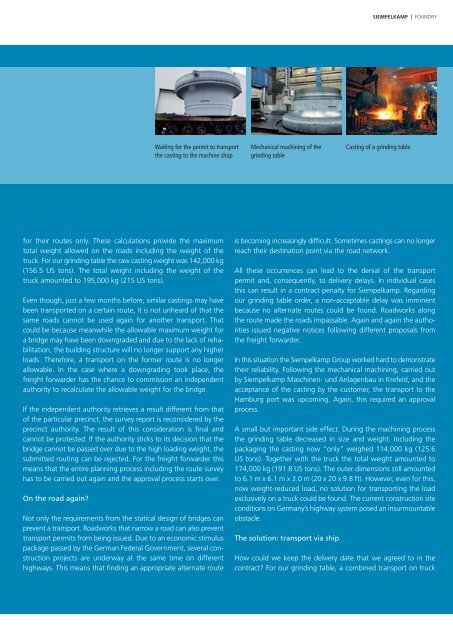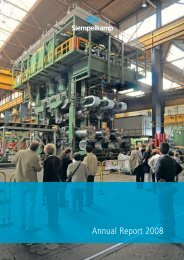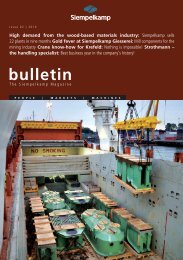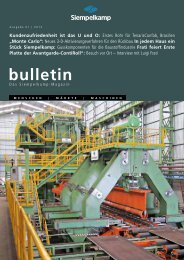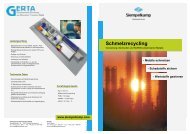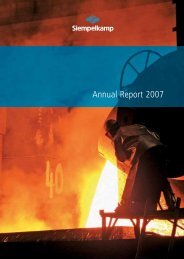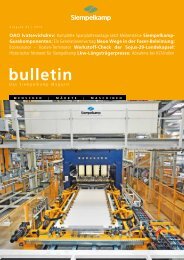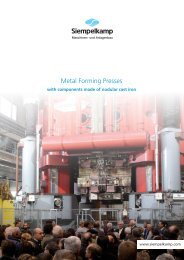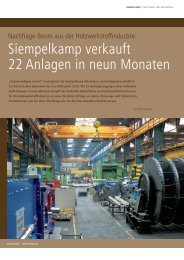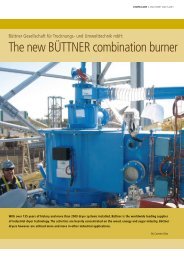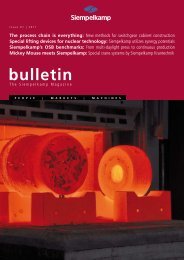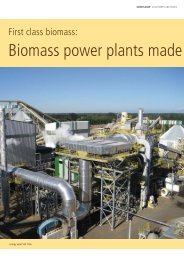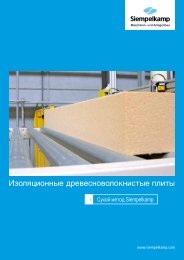Bulletin 1/2010 - Siempelkamp NIS
Bulletin 1/2010 - Siempelkamp NIS
Bulletin 1/2010 - Siempelkamp NIS
Create successful ePaper yourself
Turn your PDF publications into a flip-book with our unique Google optimized e-Paper software.
for their routes only. These calculations provide the maximum<br />
total weight allowed on the roads including the weight of the<br />
truck. For our grinding table the raw casting weight was 142,000 kg<br />
(156.5 US tons). The total weight including the weight of the<br />
truck amounted to 195,000 kg (215 US tons).<br />
Even though, just a few months before, similar castings may have<br />
been transported on a certain route, it is not unheard of that the<br />
same roads cannot be used again for another transport. That<br />
could be because meanwhile the allowable maximum weight for<br />
a bridge may have been downgraded and due to the lack of rehabilitation,<br />
the building structure will no longer support any higher<br />
loads. Therefore, a transport on the former route is no longer<br />
allowable. In the case where a downgrading took place, the<br />
freight forwarder has the chance to commission an independent<br />
authority to recalculate the allowable weight for the bridge.<br />
If the independent authority retrieves a result different from that<br />
of the particular precinct, the survey report is reconsidered by the<br />
precinct authority. The result of this consideration is fi nal and<br />
cannot be protested. If the authority sticks to its decision that the<br />
bridge cannot be passed over due to the high loading weight, the<br />
submitted routing can be rejected. For the freight forwarder this<br />
means that the entire planning process including the route survey<br />
has to be carried out again and the approval process starts over.<br />
On the road again?<br />
Waiting for the permit to transport<br />
the casting to the machine shop<br />
Not only the requirements from the statical design of bridges can<br />
prevent a transport. Roadworks that narrow a road can also prevent<br />
transport permits from being issued. Due to an economic stimulus<br />
package passed by the German Federal Government, several construction<br />
projects are underway at the same time on different<br />
highways. This means that fi nding an appropriate alternate route<br />
Mechanical machining of the<br />
grinding table<br />
SIEMPELKAMP | FOUNDRY<br />
is becoming increasingly diffi cult. Sometimes castings can no longer<br />
reach their destination point via the road network.<br />
All these occurrences can lead to the denial of the transport<br />
permit and, consequently, to delivery delays. In individual cases<br />
this can result in a contract penalty for <strong>Siempelkamp</strong>. Regarding<br />
our grinding table order, a non-acceptable delay was imminent<br />
because no alternate routes could be found. Roadworks along<br />
the route made the roads impassable. Again and again the authorities<br />
issued negative notices following different proposals from<br />
the freight forwarder.<br />
In this situation the <strong>Siempelkamp</strong> Group worked hard to demonstrate<br />
their reliability. Following the mechanical machining, carried out<br />
by <strong>Siempelkamp</strong> Maschinen- und Anlagenbau in Krefeld, and the<br />
acceptance of the casting by the customer, the transport to the<br />
Hamburg port was upcoming. Again, this required an approval<br />
process.<br />
A small but important side effect: During the machining process<br />
the grinding table decreased in size and weight. Including the<br />
packaging the casting now “only” weighed 114,000 kg (125.6<br />
US tons). Together with the truck the total weight amounted to<br />
174,000 kg (191.8 US tons). The outer dimensions still amounted<br />
to 6.1 m x 6.1 m x 3.0 m (20 x 20 x 9.8 ft). However, even for this,<br />
now weight-reduced load, no solution for transporting the load<br />
exclusively on a truck could be found. The current construction site<br />
conditions on Germany’s highway system posed an insurmountable<br />
obstacle.<br />
The solution: transport via ship<br />
Casting of a grinding table<br />
How could we keep the delivery date that we agreed to in the<br />
contract? For our grinding table, a combined transport on truck


